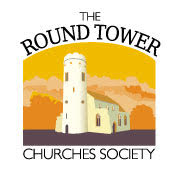A restoration of the east window of a north Norfolk church will feature a remarkable painting of an Anglo-Saxon sword pommel.
Glazier Neil Forkes started restoring the window of St Andrew, Wickmere, near Aylsham, in August. It will take a couple of months and should be completed by mid to late October – and in time for Remembrance Sunday on November 8.
The total project, which also involved restoration of the stone tracery, will cost more than £8,500.
Churchwarden Lesley Ash explained that the collapsing stone tracery had been compressing the plain glass window to such an extent that it was actually bowing. It was decided to remove the glass before it was forced out either by wind or weather.
“We were able to remove the windows intact without any damage to the glass. It will be glorious to have the window completely restored and we’re extremely grateful for the various grants received towards the cost,” she added.
The Norfolk Churches Trust awarded £2,500 – and the same amount was also given by the Round Tower Churches Society.
The first phase involved repairing the tracery by Keith and Jeffrey Atthowe, of Norwich-based G F A Stonemasonry. The glass – mostly plain probably late Victorian – was taken to the workshop on the Scottow Enterprise Park, Coltishall, for re-leading by stained glass specialist Neil Forkes. His previous commissions have included restoring the east window at St Peter’s, Brunstead, near Stalham, in 2013.
He has also been asked to include a painting of an Anglo-Saxon sword pommel in the new window, which was found by a metal detectorist on Tony and Phillida Hurn’s nearby farm.
The sword pommel, which the British Museum would like to acquire, was declared treasure at a Coroner’s Inquest in early 2018. It is thought to be worth in excess of £20,000.
Mrs Hurn, who will share the eventual proceeds with the finder, has given a substantial donation to the church because of her family connection with successive Earls of Orford, who were benefactors.
